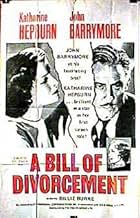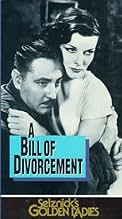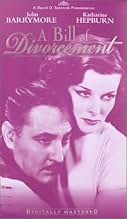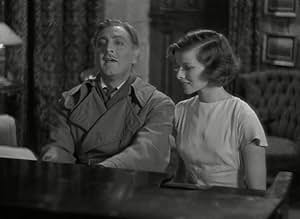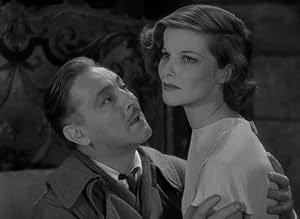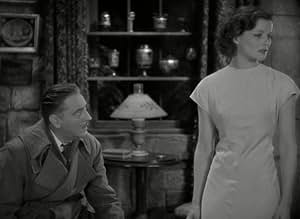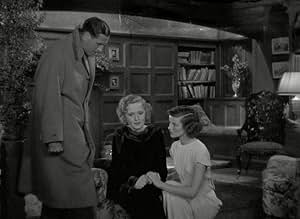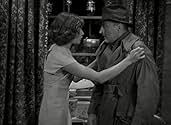A man, Hilary Fairfield returns home after fifteen years in a mental asylum. However, he finds things are not the way they were when he left.A man, Hilary Fairfield returns home after fifteen years in a mental asylum. However, he finds things are not the way they were when he left.A man, Hilary Fairfield returns home after fifteen years in a mental asylum. However, he finds things are not the way they were when he left.
- Director
- Writers
- Stars
- Awards
- 5 wins total
Bramwell Fletcher
- Gareth
- (uncredited)
Dick French
- Party Guest
- (uncredited)
Julie Haydon
- Party Guest
- (uncredited)
Dennis O'Keefe
- Party Guest
- (uncredited)
Mildred Shay
- Party Guest
- (uncredited)
- Director
- Writers
- All cast & crew
- Production, box office & more at IMDbPro
Featured reviews
A touching, very well done movie. Of course it sounds and looks stagy. Of course the acting seems melodramatic. This is the very early years of talkies, and the material is a play that was already 10 years old in 1932! That gives us some idea of how desperately Hollywood was searching for material with which to make talking pictures. John Barrymore, as other people have said, was on the slippery slope of alcoholism and lived only 10 more years, each more debilitated than the previous one. Yet he never lost his ability and it is a shame he didn't get to be in better films. He could always act! And he knew that his style was dated. He said that his was a 'middle' generation of stage acting, between the florid romantic style of the late 19th and early 20th centuries and the more naturalistic style that followed. Any time he worked with actors and directors he respected: Marie Dressler, Greta Garbo, Hepburn, Billie Burke, Carole Lombard, George Cukor, Howard Hawks --Barrymore turned in an excellent performance.
This somewhat stagy early talkie is noteworthy for several reasons. First, it is Katharine Hepburn's screen debut, and it is interesting to see that even at 24 she is the prototype of the confident woman that she played in all of her films. Hepburn likely made quite a first impression on audiences with her lean athletic look versus that of typical film heroines of that era that still had that combination china doll and ex-flapper look that was so popular in the 20's. Likewise, just as it is the beginning of Hepburn's career, it is nearing the end of John Barrymore's. By the end of the decade alcoholism and, by some reports, early onset Alzheimer's disease, cause the end of his career. Also, it is interesting to see society's attitudes towards divorce and mental illness in the early 1930's.
Meg Fairfield (Billie Burke) has waited fifteen years while her husband Hilary (John Barrymore) is in a mental institution before finally obtaining a divorce. Shortly before her remarriage, Hilary "comes to himself" and returns home. To complicate matters further, their daughter Sydney (Katharine Hepburn) believes her father has been insane due to shell-shock. However, she soon learns that there is actually insanity in the family and wonders if either she will go insane herself or if her children will. The family doctor also hardly has a good bedside manner in dealing with the situation, saying that "who shall be sacrificed the lame or the whole?" and mentioning that Hilary's child, Sydney, shouldn't even have been born. Startling today, but probably a pretty typical attitude 75 years ago. One of the players puts it best when they mention that people always grieve the dead, but wonder how their reaction would change if the dead were suddenly alive again, which is basically Hilary's situation. Insane he could be mourned for what he once was, recovered he is just in the way. In spite of the usually able direction of George Cukor, this movie comes across as over-the-top melodramatic. However, given its place in Hepburn's film career, it is definitely worth viewing.
Meg Fairfield (Billie Burke) has waited fifteen years while her husband Hilary (John Barrymore) is in a mental institution before finally obtaining a divorce. Shortly before her remarriage, Hilary "comes to himself" and returns home. To complicate matters further, their daughter Sydney (Katharine Hepburn) believes her father has been insane due to shell-shock. However, she soon learns that there is actually insanity in the family and wonders if either she will go insane herself or if her children will. The family doctor also hardly has a good bedside manner in dealing with the situation, saying that "who shall be sacrificed the lame or the whole?" and mentioning that Hilary's child, Sydney, shouldn't even have been born. Startling today, but probably a pretty typical attitude 75 years ago. One of the players puts it best when they mention that people always grieve the dead, but wonder how their reaction would change if the dead were suddenly alive again, which is basically Hilary's situation. Insane he could be mourned for what he once was, recovered he is just in the way. In spite of the usually able direction of George Cukor, this movie comes across as over-the-top melodramatic. However, given its place in Hepburn's film career, it is definitely worth viewing.
When Hollywood was madly casting the ingénue in "A Bill of Divorcement," they saw many, many tests of actresses but still weren't satisfied. Katharine Hepburn took a look at the test scene and realized immediately why no actress was acceptable - it was a terrible scene. So she did another one and won the role.
Let's just say that Hepburn started her amazing career with amazing good fortune. Her director was the excellent George Cukor, marking the beginning of their marvelous collaboration; and she had the great John Barrymore as a co-star.
The story concerns a man who comes home from an insane asylum only to discover that his daughter has grown up, his wife has divorced him, and she is about to marry someone else. He's as much in love with her as he has always been and can't bear the thought of her leaving him.
Based on a play by Clemence Dane, "A Bill of Divorcement" doesn't hold up today. It's very talky, done in a stagy manner, and melodramatic. Some of the performances are melodramatic as well - it was the beginning of talkies, and many of the actors had not yet adapted to the technique of acting on film, Billie Burke especially. My big quibble with the story is that, due to the times, it can't distinguish between "insanity" and emotional problems or chemical imbalances, which makes the Hepburn character's ultimate sacrifice seem unnecessary.
You can really see in this movie how Katharine Hepburn would have been so unusual to audiences with her angular, athletic body, high cheekbones and austere looks. She once said of Angela Lansbury, "She was unusual in the wrong way, and I was unusual in the right way." It's certainly true. She's quite beautiful and interesting-looking. Ultimately she would tone down her acting. For a first film, she's wonderful.
The star is John Barrymore, who gives a timeless, heart-wrenching performance. What a wonderful actor and what a loss that his last film was made in 1941 and as early as 1938, he was playing his roles drunk.
Recommended definitely for Hepburn aficionados and to see the great John Barrymore being the magnificent actor he was capable of being.
Let's just say that Hepburn started her amazing career with amazing good fortune. Her director was the excellent George Cukor, marking the beginning of their marvelous collaboration; and she had the great John Barrymore as a co-star.
The story concerns a man who comes home from an insane asylum only to discover that his daughter has grown up, his wife has divorced him, and she is about to marry someone else. He's as much in love with her as he has always been and can't bear the thought of her leaving him.
Based on a play by Clemence Dane, "A Bill of Divorcement" doesn't hold up today. It's very talky, done in a stagy manner, and melodramatic. Some of the performances are melodramatic as well - it was the beginning of talkies, and many of the actors had not yet adapted to the technique of acting on film, Billie Burke especially. My big quibble with the story is that, due to the times, it can't distinguish between "insanity" and emotional problems or chemical imbalances, which makes the Hepburn character's ultimate sacrifice seem unnecessary.
You can really see in this movie how Katharine Hepburn would have been so unusual to audiences with her angular, athletic body, high cheekbones and austere looks. She once said of Angela Lansbury, "She was unusual in the wrong way, and I was unusual in the right way." It's certainly true. She's quite beautiful and interesting-looking. Ultimately she would tone down her acting. For a first film, she's wonderful.
The star is John Barrymore, who gives a timeless, heart-wrenching performance. What a wonderful actor and what a loss that his last film was made in 1941 and as early as 1938, he was playing his roles drunk.
Recommended definitely for Hepburn aficionados and to see the great John Barrymore being the magnificent actor he was capable of being.
It's Christmas in England. World War I veteran John Barrymore (as Hilary Fairfield) has been committed to an asylum for 15 years, due to insanity brought on by "shell shock". The season has resulted in a blessing for Mr. Barrymore, who is on his way home for the holidays, after recovering his sanity. Meanwhile, wife Billie Burke (as Margaret "Meg" Fairfield) has fallen in love again, received a divorce, and is planning to re-marry. Barrymore's return throws the household into turmoil. Daughter Katharine Hepburn (as Sidney Fairfield), also planning to marry, begins to fear starting her own family, after learning Barrymore's madness is hereditary.
It's admittedly not intended as such, and consequently not exceptional; but, George Cukor's "A Bill of Divorcement" should be seen as a filmed stage play. The story is thought-provoking; it mixes madness, marriage, and war with duty, self-sacrifice, and religion. The characterizations are, today, "outdated" in style, substance, and storyline. Still, they are interesting in context. The three lead performances are significant: Barrymore's theatrical skills are clearly evident; his performance is most enjoyable (the war duty scene is a highlight). Additionally, Ms. Burke begins a welcome "second career" in sound films; and Ms. Hepburn begins a welcome "second career" in films. With less to do, steadfast supporting actress Elizabeth Patterson (as Hester Fairfield) definitely holds her own.
****** A Bill of Divorcement (1932) George Cukor ~ John Barrymore, Billie Burke, Katharine Hepburn
It's admittedly not intended as such, and consequently not exceptional; but, George Cukor's "A Bill of Divorcement" should be seen as a filmed stage play. The story is thought-provoking; it mixes madness, marriage, and war with duty, self-sacrifice, and religion. The characterizations are, today, "outdated" in style, substance, and storyline. Still, they are interesting in context. The three lead performances are significant: Barrymore's theatrical skills are clearly evident; his performance is most enjoyable (the war duty scene is a highlight). Additionally, Ms. Burke begins a welcome "second career" in sound films; and Ms. Hepburn begins a welcome "second career" in films. With less to do, steadfast supporting actress Elizabeth Patterson (as Hester Fairfield) definitely holds her own.
****** A Bill of Divorcement (1932) George Cukor ~ John Barrymore, Billie Burke, Katharine Hepburn
VERY stagy but interesting film served as Hepburn's screen bow. She's a trifle studied and Barrymore occasionally goes over the top but mixed in with that is some excellent acting by both. Billie Burke, more subdued than usual, delivers the film's best most consistent performance. She does a very fine job of showing the anguish of a life suddenly turned upside down. The three of them are really the whole show.
Considering the cast and the historical place in Kate's filmography as her debut the film is frustratingly difficult to see. Odd considering the relative availability of the rest of her canon, exempting the obscure Grace Quigley.
Some of the attitudes are dated but because of the star trio this is worth tracking down.
Considering the cast and the historical place in Kate's filmography as her debut the film is frustratingly difficult to see. Odd considering the relative availability of the rest of her canon, exempting the obscure Grace Quigley.
Some of the attitudes are dated but because of the star trio this is worth tracking down.
Did you know
- TriviaDavid O. Selznick and George Cukor disagreed about casting Katharine Hepburn. Cukor had seen Hepburn's screen test and was impressed by the 24-year-old, but Selznick did not like the way she looked and was afraid she would not be well received by audiences. Cukor cast her anyway (beginning what would be a lifelong professional and personal relationship between the two)
- Goofs'Katharine Hepburn' is misspelled in the credits as 'Katherine Hepburn'.
- Quotes
Hilary Fairfield: Do you know what the dead do in Heaven? They sit on their golden chairs and sicken for home.
- Crazy creditsSydney Fairfield is the name of Katharine Hepburn's character in the film, but her name is spelled Sidney in the credits.
- ConnectionsFeatured in David O. Selznick: 'Your New Producer' (1935)
- SoundtracksSilent Night, Holy Night (1818)
(uncredited)
Music by Franz Xaver Gruber
Lyrics by Joseph Mohr
English lyrics anonymous
Sung by carollers on Christmas Eve
- How long is A Bill of Divorcement?Powered by Alexa
Details
Box office
- Budget
- $300,000 (estimated)
- Runtime1 hour 10 minutes
- Color
- Aspect ratio
- 1.37 : 1
Contribute to this page
Suggest an edit or add missing content


